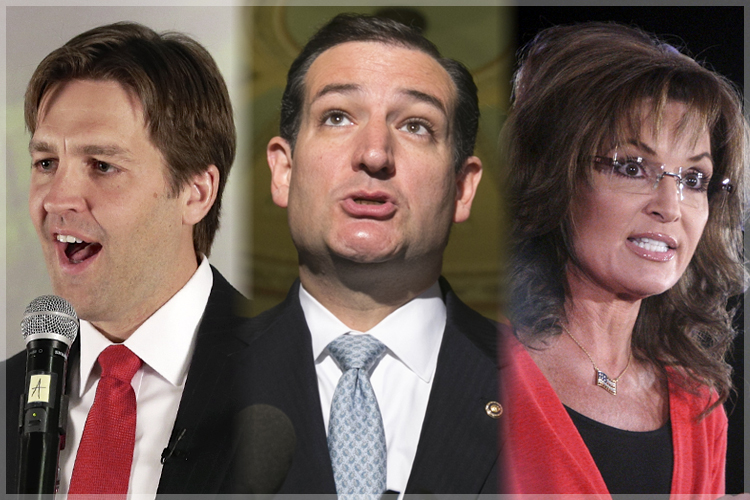Jim Newell hit the nail on the head about the alleged “revenge of the GOP establishment” in this week’s primary elections. Yes, they are all Tea Partyers now. Who needs the label when they are getting everything they want from the establishment?
In fact, the Tea Party has always been populated by the rank and file far right of the party. Yes, they expressed hostility to their elected officials in Washington. They were angry that the Democrats won a majority and they blamed their leadership for letting that happen. But as John Boehner explained just yesterday:
You get in these primary elections – they are hard-fought battles and sometimes – listen, there is not that much, not that big a difference between what you call the tea party and your average conservative Republican.
Indeed. Nonetheless, it is interesting that so far in these primaries the major victory claimed by the Tea Partyers doesn’t feature a standard libertarian-ish right-wing Republican railing against Big Government and babbling about Benghazi!™. It features a hardcore member of the Christian right, which is hardly the image of the Tea Party in the political press. That would be Ben Sasse of Nebraska, the Yale-educated history professor who had the backing of Tea Party groups like Freedomworks, the Senate Conservatives Fund and Club for Growth, and Tea Party icons Sarah Palin and Sen. Ted Cruz, R-Texas. He won the primary against establishment-backed State Treasurer Scott Osborne. Yes, he hates Big Government as much as any right-wing Republican, that goes without saying. But Sasse is motivated by his belief that the U.S. is a Christian nation under siege from that Big Government, not by his belief in free markets and low taxes.
Sarah Posner at Religion Dispatches unearthed his doctoral thesis from 2004 and it’s a fascinating treatise on the origins of the modern religious right in America. Unlike most historians, he believes that the conservative movement grew up in the 1960s not out of rebellion against the civil rights stances of the Democratic Party but rather the “secularization” of the culture in the wake of the Supreme Court rulings banning school prayer and Bible reading. He even goes so far as to claim that rather than a cynical decision to stoke the flames of Southern racism with the Southern strategy, it was Richard Nixon’s deep understanding of the Christian culture that led him to persuade evangelicals and conservative Catholics to join the GOP and usher in the era of conservatism in the last decades of the 20th century. It’s a novel understanding of that history, to say the least. Most historians cite Nixon’s pursuit of blue-collar Catholics as part of the strategy to peel off working-class votes with racial resentment. But Sasse’s dissertation is evidently persuasive in at least some respects.
But regardless of his level of accomplishment as a scholar, Ben Sasse clearly sees the world through the lens of a conservative Christian crusader. According to his website, he is a proponent of the most radical interpretation of religious freedom that’s in circulation today on the far right:
Ben Sasse believes that our right to the free exercise of religion is co-equal to our right to life. This is not a negotiable issue. Government cannot force citizens to violate their religious beliefs under any circumstances. He will fight for the right of all Americans to act in accordance with their conscience.
One wonders if he believes the child molestation at Warren Jeffs’ polygamous compound or Shariah Law honor killings are also non-negotiable religious beliefs that the government cannot force those people to violate under any circumstances. In any case, he is certainly a proponent of the Christian right manifesto, the Manhattan Declaration, which aims to change the strategy of the religious right from a purely moral argument to a legal doctrine that exempts religious adherents from following the law of the land.
One might wonder why the so-called libertarian Tea Partyers would back such a fellow even if he were right on all their economic issues. But one of the major misapprehensions about the Tea Party has always been the idea that it was not socially conservative, as if all those tricorner hat-wearing patriots were solely concerned with tax rates and regulations. The Pew Poll showed otherwise years ago:
Tea Party supporters tend to have conservative opinions not just about economic matters, but also about social issues such as abortion and same-sex marriage. In addition, they are much more likely than registered voters as a whole to say that their religion is the most important factor in determining their opinions on these social issues. And they draw disproportionate support from the ranks of white evangelical Protestants.
A Tea Party by any other name would smell as socially conservative. Just ask Ted Cruz, another Ivy League Tea Partyer who recently made a pilgrimage to Liberty University and declared, “These are troubled times, and religious liberty, the very first liberty in the Bill of Rights, the very first protection we have, has never been more in peril than it is right now.” Or Sarah Palin, another Tea Party favorite who wears her social conservatism on her sleeve.
The point is that whether it’s the establishment winning as they ostensibly did in this week’s primaries or the Tea Party upsetting the conventional wisdom as they did last week in nominating Ben Sasse, it makes no difference. The three-legged stool of the GOP — family values, small government and national security — is as solid as it’s ever been, whatever they choose to call themselves. Sure, they may have a few Rand Paul fans ineffectually batting at one of those legs, but the Tea Party is right there with the establishment holding it steady.

